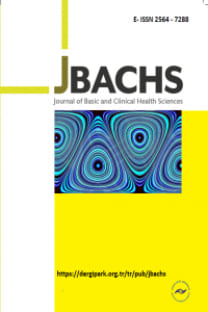Effects of the Simulation Based Training Program on Attitudes of Nurses Towards Older Adults: A Quasi-Experimental Design Study
Purpose: Innovative activities such as the simulation-based training program can affect nurses’ attitudes toward older adults. This study was aimed to determine the effects of the simulation-based training programs on nurses’ attitudes towards older adults in institutional care settings.
Methods: A quasi-experimental pretest–posttest design was used. A total of 92 nurses participated in simulation-based training program that comprised presentation about care for older adults, and scenario with aged simulation suit. Data were collected using a Participant Information Form and Kogan’s Attitudes Toward Old People Scale. The value, mean, percentage frequency distribution, and paired sample t-test were used.
Results: After the simulation-based training programs were completed, the mean total score (p=0.001) and positive attitudes of score of the nurses was changed statistically significantly (p=0.001). There was no statistically significant change negative attitudes (p=0.274).
Conclusions: The simulation-based training program is effective in developing more positive and less negative attitude toward the older adults by nurses in institutional care settings. The aging-simulation experience affected health professionals’ feelings and knowledge. To provide better care for the older adults, it is important that nurses adopt a positive attitude toward the older adults.
Keywords:
Aged, Attitude, Nurses, Nursing Homes.,
___
- Ministry of Family and Social Policies, Directorate General of Services for Persons with Disabilities and Elderly People. Residential and Nursing Homes connected to our General Directorate (Data for September 2019) Retrieved from: https://www.ailevecalisma.gov.tr/eyhgm/kuruluslar/yasli/ Accessed July 25, 2021.
- Burnes D, Sheppard C, Henderson Jr C., Wassel M, Cope R, Barber C, Pillemer K. Interventions to reduce ageism against older adults: A systematic review and meta-analysis. Am J Public Health 2019;109(8), e1-e9.
- Liu Y-E, Norman IJ, While AE. Nurses’ attitudes towards older people: A systematic review. Int J Nurs Stud. 2013;50(9):1271-1282.
- Akpinar Soylemez B, Kucukguclu O, Tekin N, Akyol MA, Isik AT. Nursing homes nurses’ attitudes toward older people and affecting factors. Turk J Geriatr. 2018;21(2):271-278.
- Tavares JPA, Silva AL, Sa-Couto P, Boltz M, Capezuti E. Portoguese nurses’ knowledge of and attitudes toward hospitalized older adults. Scand J Caring Sci. 2015;29(1):51-61.
- Perot JG, Jarzebowski W, Lafuente-Lafuente C, Crozet C, Belmin J. Aging-simulation experience: Impact on health professionals’ social representations. BMC Geriatrics 2020;20(1):14.
- Ross L, Williams B, Jennings P. The effectiveness of educational interventions designed to improve health care students behaviors and/or attitudes toward older people: A systematic review protocol. JBI Database System Rev Implement Rep. 2015;13(7):13-23.
- Rueffert D, Bullinger AC (2019, July) Observing or Experiencing–The Effect of Age Simulation on the Sensitivity to Age-Related Impairment in Elderly Care. In: Goonetilleke R., Karwowski W. (Eds) Advances in Physical Ergonomics and Human Factors. 1st edition, Advances in Intelligent Systems and Computing (pp 339-347), Springer.
- Wendel VI, Durso SC, Cayea D, Arbaje AI, Tanner E. Implementing staff nurse geriatric education in the acute hospital setting. MEDSURG Nursing 2010;19(5):274-280.
- McCloskey R, Yetman L, Stewart C, Slayter J, Jarrett P, McCollum A, Stoica G. Changes in nursing students' knowledge, attitudes and interest in caring for older adults: A longitudinal cohort study. Nurse Educ Pract 2020;44,102760.
- Demirtas A, Basak T. Daily activities simulation: Improving nursing students' attitudes toward older patients. Jpn J Nurs Sci. 2020:e12375.
- Sari D, Taskiran N, Baysal E, Acar E, Cevik Akyil R. Effect of an aged simulation suit on nursing students’ attitudes and empathy. Eur Geriatr Med. 2020;11(4),667-675.
- Eost‐Telling C, Kingston P, Taylor L, Emmerson L. Ageing simulation in health and social care education: A mixed methods systematic review. J Adv Nurs. 2021;77(1):23-46.
- GERT Age simulation suit Retrieved from: www.age-simulation-suit.com Accessed July 25, 2021.
- Kogan N. Attitudes toward old people: The development of a scale and an examination of correlates. J Abnorm Psychol. 1961;62(1):44.
- Neville C. Undergraduate nurse attitudes toward older adults and perceptions of working with older adults: An analysis of measurement instruments. Nurse Educ Today. 2015;35(1):183-188.
- Küçükgüçlü Ö, Mert H, Akpinar B. Reliability and validity of Turkish version of attitudes toward old people scale. J Clin Nurs. 2011;20(21-22):3196-3203.
- Koh GCH, Ling CLH, Chen Cynthia C, Lim WS, Scherer SC, … Merchant RA. Effect of a new longitudinal interprofessional geriatric medicine educational track on knowledge and attitude of medical students: A controlled cohort study. J Am Geriatr Soc. 2015;63(3):558-564.
- Turan E, Yanardağ M, Metintas S. Attitudes of students of health sciences towards the older persons. Nurse Educ Today. 2016;36:53-57.
- Tufan F, Yuruyen M, Kizilarslanoglu MC, Akpinar T, Emiksiye S, Yesil Y, … Yavuzer H. Geriatrics education is associated with positive attitudes toward older people in internal medicine residents: A multicenter study. Arch Gerontol Geriatr. 2015;60(2):307-310.
- Chance K, Simpler B, Forehand JW, Spurlock A, Alberich J. An international effort examining nursing student attitudes toward older people. Teach Learn Nurs 2021;16:125-130.
- Bowden A, Wilson V, Traynor V, Chang HC. Exploring the use of ageing simulation to enable nurses to gain insight into what it is like to be an older person. J Clin Nurs 2020;29(23-24), 4561-4572.
- Birimoglu Okuyan C Bilgili N, Mutlu A. Factors affecting nursing students' intention to work as a geriatric nurse with older adults in Turkey: A cross-sectional study. Nurse Educ Today 2020;95,104563.
- Yayın Aralığı: Yılda 3 Sayı
- Başlangıç: 2016
- Yayıncı: DOKUZ EYLÜL ÜNİVERSİTESİ
Sayıdaki Diğer Makaleler
Elif Ozyurt, Keziban Avci, Figen Cizmeci Senel
Mehmet Demirci, Seda Ekici, Akin Yigin
Mahdi AKBARPOUR, Aybuke OLGUN, Yasemin BASBINAR, Inci ALACACIOGLU, Serife SOLMAZ, Ozlem BIRGE, Hulya ELLIDOKUZ, Tugba UYSAL KILIC
Gulser Kilinc, Mujdet Cetin, Umran Ergun Ertunc, Zafer Berk Kose, Alp Abidin Atesci
Seyda SEREN INTEPELER, Yasemin AYHAN ONCU, Selmin SENOL, Canan DEMIR BARUTCU
Ecem AYDENIZ, Seyda SEREN INTEPELER
Hatice Durak, Sultan Eser, Turkan Ozbay, Ozlem Karadeniz, Ozgul Vupa Cilengiroglu
Mehmet Ali Ozcan, Gulen Gul, Sermin Ozkal
